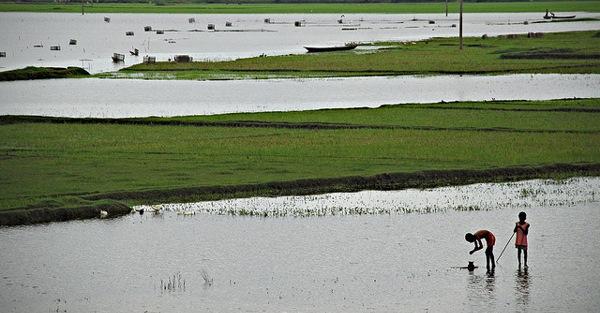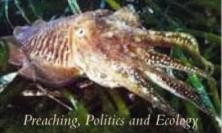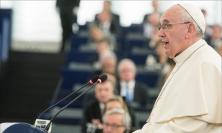In August 2015, several Islamic institutions and individuals came to together to issue an important new document about the urgent challenges posed by climate change. Damian Howard SJ outlines the vision and significance of the Islamic Declaration on Climate Change, which explores new interpretations of the Qur’an. How much common ground is to be found between this declaration and Pope Francis’ encyclical, Laudato si’?
Christianity is not the only world religion getting to grips with the challenge of the environmental crisis. There have already been public positions taken by Buddhists and Jews and plans are afoot for a Hindu statement later this year. Perhaps most significantly, given that Islam is the world’s second largest religion, August 2015 saw the release in Istanbul of an Islamic Declaration on Climate Change.[1] This is something to be welcomed and supported by Catholics everywhere. Islam’s geographical spread is vast. Many of the major oil-producing countries are situated in its Arab heartlands whilst some of those countries most vulnerable to the effects of climate change, notably low-lying Bangladesh and Indonesia, represent core centres of Muslim population. There is no doubt that the addition of a strong Muslim voice to the chorus of those demanding a coherent moral response to the world’s ecological problems would be a huge strategic asset. Cardinal Peter Turkson, President of the Pontifical Council for Justice and Peace, hailed the development, promising that Catholics would pray for the success of the initiative and were ready to work with Muslims ‘to care for our common home and thus to glorify the God who created us’.[2]
Islam and Ecology
Muslim thinking on ecological matters is not by any means new. A notable contribution to global ecological concern has been made by the American-Iranian scholar, Professor Seyyed Hossein Nasr (b. 1933), currently of George Washington University, Washington D.C., who addressed the Istanbul symposium.[3] Nasr has been writing on the subject since as early as the 1960s and has inspired generations of Muslims to consider what he regards as the inherently ecological sensibility of the Muslim worldview. His approach is informed, admittedly, by a non-mainstream interpretation of Islam. Profoundly influenced by the perennialist school of René Guénon (1886-1951) and Frithjof Schuon (1907-98), both converts to esoteric Sufism, Nasr expounds a neo-Platonic expression of the religion which is fundamentally and radically hostile to secular modernity in all its dimensions. The ecological crisis is, for him, the severest manifestation of the West’s tragic deviation from the sacred and traditional form of civilisation which has hitherto been the universal norm. His analysis of the current ecological crisis traces the problem all the way back to the beginnings of rationalism in medieval Christianity, a secularising development related to the thought of Ibn Rushd which led slowly and surely, he believes, to a negation of sacred tradition and its perennial metaphysics which is the hard ideological core of nihilistic European materialism. Nasr would certainly be in agreement with Pope Francis’ conviction that the environmental crisis is no mere technical problem but a sign of a profound disorder in the way modern men and women conceive their relationship with the natural world.[4] The Holy Father’s use of the word ‘Promethean’ would also find a strong echo in Nasr’s work.[5]
Nevertheless, beyond the significant common ground of a principled objection to the anthropological vision behind many of the practices and convictions of modernity, Catholics will respectfully take a certain distance from a position which finds only moral and spiritual bankruptcy in every manifestation of modern science and technology. Laudato si’ is careful not to take this line, presenting a balanced assessment of the achievements and maladies of the entire modern world;[6] if the Holy Father wants to see it change, it is not its undoing he envisages but a new and radical expression within it of our creaturely connectedness to the cosmos.
For Christians, the Biblical text which captures the human vocation in creation is the cosmogonic narrative laid out in Genesis. It describes human beings as made in the imago Dei, a constitutional privilege which entails dominion over the other creatures (Gen 1:26-8). Laudato si’ elucidates what this does and does not imply, Pope Francis speaking of a disordered anthropocentrism which has construed the divine mandate in terms of domination and exploitation rather than the stewardship and care it really entails.[7]
The Qur’anic view is surprisingly similar. The key anthropological motif appears in verse 35 of the Qur’an’s second surah, al-Baqara, where God announces His intention to create on the earth a khalifah, usually translated in English as vice-gerent.[8] This figure appears to match the function of the imago Dei in Genesis, viz. representing God’s rule on earth. The Qur’an also speaks of human beings as having been granted ‘the trust’ (al-amanah in Qur’an 33:72) by God, a gift which has been interpreted as involving care for and stewardship over creation.[9] The common ground between the two religions is striking but it leaves many questions unresolved. What does it mean to ‘represent’ God’s rule over creation? How are human beings to fulfil their divinely ordained role? Indeed, can they do so? The twin doctrines of imago Dei and khalifah do not define answers so much as frame the questions.
Care and Human Dignity
Pope Francis’ teaching in Laudato si’ does essay an answer. His anthropological vision focuses on the word ‘care’ which appears dozens of times in the encyclical. Care brings with it strong affective connotations which foreground the need for human beings not just to fulfil a moral duty but to feel profoundly involved in what they are responsible for. Care not only stresses our interconnectedness at every level with the natural world but is the key virtue required to honour it.
It is striking that the Holy Father also felt it necessary to underline that ‘we are not God’.[10] Certainly he has Promethean modernity in his sights. But it may also be that in relativising the place of human beings in the world he has in mind a tendency in certain religious circles to absolutise human dignity in a way that is not ultimately compatible with theism. Human dignity in Laudato si’ is conceived of in relation to the intrinsic worth of other created beings, not as something which competes with, let alone negates, it.[11] Indeed, it is, he says, precisely by honouring and respecting ‘the laws of nature and the delicate equilibria existing between the creatures of this world’[12] that humanity is to fulfil its role as imago Dei.
Muslims have not infrequently been accused by westerners, Christians among them, of failing to accord to human beings the absolute dignity which human rights rhetoric seems to assert. In the light of Pope Francis’ ringing ecological reflection, this fact reminds us that Islam, by virtue of the exclusive and absolute demand of its monotheism, has actually managed to avoid the trap of disordered anthropocentrism into which some western thought has fallen. Indeed, this anthropocentrism and the moral crisis which flows from it are experienced by Muslims by and large not as by-products of their history but as an extraneous intrusion which has impacted on them through past colonialism and present globalisation.[13] Both these facts give Muslims a certain advantage in responding effectively to the challenges of the ecological crisis and suggest that Christians might have something to learn from the experience and perspective of Muslims.
Challenges for Muslims
With those two Muslim advantages go two structural challenges. The first has to do with how authority works in Islam, the second with the mode of its religious thought. It is often said that there is no priesthood or hierarchy in Islam. Hence, although the Muslim world is marked by astonishing diversity and multi-polarity, there is no Muslim ‘Vatican’ to define its position or to arbitrate its conflicts of interpretation. Hence, no single body or individual is entitled to issue a definitive statement of the Muslim position on the care of the environment, and those Muslims (and non-Muslims) hoping for such a pronouncement will be perpetually frustrated.[14] This is not to say, however, that no legitimate sources of religious authority exist as such. There is, for example, the venerable university of al-Azhar in Cairo, the world’s most respected seat of Islamic learning. There are ad hoc bodies, too, which have been convened for this or that purpose, such as the group of 138 scholars who, at the behest of the Royal Aal al-Bayt Institute for Islamic Thought in Jordan, signed ‘A Common Word’ in 2007, a ground-breaking invitation to Christians all over the world to engage in interreligious dialogue.[15] However much credibility a statement such as this may have, it is not ultimately binding on believers and is likely to be under-publicised and consequently little-known.
The second challenge for Muslim religious thought resides in the fact that Islam is rather less in thrall to speculative or philosophical discourse than is Christianity, broadly conceived. To use an oft-repeated (and not entirely accurate) shorthand, Islam is a religion of law.[16] Religious pronouncements tend, therefore, to involve reiterations of the sources of law: Qur’anic citations, traditions of the prophet (hadiths) and the references to the writings and judgments of great legal scholars of the past. Islamic religious thought, in its classical form, does not naturally lend itself to abstraction, conceptualisation or codification, let alone talk of a ‘critique of new paradigms’.[17] Whilst some contemporary Muslims have sought to come up with new genres of religious thought along these lines, doubts on authority accompany any scholarship which springs up outside the traditional framework, methods and institutions of classical Islam. This makes for a conservative bias in Muslim religious thought.
The Declaration
With all this in mind, we turn to the Declaration released in August. A first point to note is that delegates from some twenty countries were involved; it is not a merely parochial affair but an initiative of global ambition. The launch took place in Istanbul, an Islamic capital of great significance and the Declaration is in English, which, along with Arabic, is the de facto lingua franca of the modern Islamic world. Scholars, we are told, were consulted in the drafting of the declaration and some of those who gave their support, notably the Grand Muftis of Lebanon and Uganda and the chair of the Indonesian Council of Ulema (jurists), have considerable credibility in their own countries. The coalition of individuals and institutions involved were convoked by a small circle of NGOs but it boasts the collaboration of three high-profile international Islamic organisations.[18] For all that the declaration’s authority will be limited for the reasons given above, there is reason to hope that many Muslims will be made aware of it and imams will feel confident in preaching about it.
When it comes to the contents of the Declaration, a first thing to note from the title is that it has a single focus: the issue of climate change. Other ecological issues are mentioned in passing but they are secondary. This is probably a matter of strategy: the document aims to have an impact on the proceedings of the United Nations Climate Change Conference to be held in Paris in December 2015. It is worth noting that the Muslim initiative was able to name the issue and face the scientific evidence without having to contend with a constituency of climate change deniers. This is in striking contrast to the battle that had to be joined in the United States after the publication of Laudato si’.
The Declaration’s preamble outlines the factors that led to the drawing up of the document. It starts with a doctrinal affirmation that God created the world and then moves on to the statement that the planet ‘has existed for billions of years’. This acceptance of the earth’s great age is noteworthy in itself. The theory of evolution is still controversial in the Muslim world. Although many thousands of Muslim scientists work within disciplines based on Darwinian assumptions, it is still the case that the default position among religious leaders tends to be that of creationism. There is, it is true, an ‘old earth creationism’ which defends the compatibility of the findings of modern geology with belief in the direct creation of human beings by God. But to most readers, this statement indicates a modern scientific outlook rather than a creedal fundamentalism. It also suggests that the anti-evolutionary stance of Seyyed Hossein Nasr has not been influential in the drafting of the Declaration.[19]
The following paragraph gives a theological interpretation of the phenomenon of climate change: it is the result of failure to live up to our human duty of care and stewardship for creation, i.e. our role as God’s khalifah on earth. Instead of cherishing the gift of the world, we have corrupted and abused it. The text speaks, in terms similar to Laudato si’, of the ‘earth’s fine equilibrium’ and of our being ‘woven into the fabric of the natural world’. There then follow several paragraphs in which the severity of the current situation is highlighted and alarm expressed at what little has been achieved by way of solution.
New Readings of the Qur’an
A series of creedal affirmations then follows. Most of them are straightforward Qur’anic expressions of God’s lordship over creation. They build a cumulative case for saying that care for the environment is an inherently Muslim concern. Then come some Qur’anic passages deployed and interpreted in a fresh way for the new context. For example, Qur’an 55: 7-10:
He raised the heaven and established the balance (mizan)
So that you would not transgress the balance.
Give just weight – do not skimp in the balance.
He laid out the earth for all living creatures.[20]
This text has been used by a number of Muslim ecologists to show the Qur’an’s concern for the balance (mizan) of creation, now a key concept in a new Islamic theological cosmology.[21] Again, Qur’an 30:30 is used to interpret the Arabic word fitrah as the divinely-willed pattern of the created order:
So set your face firmly towards the (natural) Way
As a pure, natural believer
Allah’s natural pattern (fitrah) on which He made mankind
There is no changing Allah’s creation.
That is the true (natural) Way
But most people do not know it.
Now, the Arabic term translated twice as ‘the (natural) Way’ is din, normally understood as meaning ‘religion’ and, in this case, the true religion of Islam. Fitrah has usually been thought of as being an in-built human inclination towards the truth proposed by Islam. The re-interpretation of the text in a cosmological sense will be greeted by many Muslims, no doubt, as a creative way of bringing forth fresh meanings from scripture to help believers deal with a major crisis. For some, it may well be less convincing. Again, the issue of authority comes into play.
After an exploration of other new interpretations, the Declaration settles on the example of Muhammad. All Muslims, especially Sunnis, take the custom of the prophet Muhammad as the final word on right conduct. It is inevitable that his behaviour should be invoked in support of the declaration’s assertions. It positively helps that he did not live during industrial capitalism but at a time when human beings lived more harmoniously with the natural world. Certain traits of his are appealed to so as to guide us back towards that harmony. The text cites Muhammad’s simplicity of lifestyle (including his sparse intake of meat), his commending of the protection of scarce desert resources such as water, and his establishment of sanctuaries for the protection of plant and animal life.
The Declaration ends with a series of appeals: to those negotiating at the UN conference in Paris, asked to bring the talks to a satisfactory conclusion; to rich countries, who are implored to shoulder the lions’ share of the financial burden of phasing out fossil fuels for the benefit of the poor; to people of all nations, encouraged to give up fossil fuels and to adopt in their place renewable energy sources, and to devise a new model of well-being which does not damage the planet; and finally to corporations, finance, and the business sector, who are invited to take responsibility for the effects of their pursuit of profit and to put their weight behind the pursuit of a sustainable economic system.
That there is much common ground with the position of Laudato si’ is abundantly clear. The Declaration is, however, much shorter, more narrowly focused and less ambitious in grounding ecological concern within a comprehensive religious vision. How significant it will prove to be is impossible to predict; just as the destiny of Laudato si’ depends on the extent to which the Catholic faithful take it to heart and use it to exert helpful pressure on those who will represent them in Paris, so the Islamic Declaration needs ordinary Muslims to do the same. After Paris, the real work must begin, and hopefully there will be the interreligious ‘collaboration, co-operation and friendly competition’[22] to which the Declaration and the Catholic Church both look forward.
Damian Howard SJ is a lecturer at Heythrop College, University of London and a member of the editorial board of Thinking Faith.
This article was first published in issue 3967 of La Civiltà Cattolica.
[1] See the text online at http://islamicclimatedeclaration.org/islamic-declaration-on-global-climate-change/
[2] For the Cardinal’s full message to the Istanbul symposium, see http://en.radiovaticana.va/news/2015/08/17/cardinal_turkson_all_faiths_must_work_together_on_ecology/1165624
[3] His writings on ecological matters include Man and Nature: The Spiritual Crisis in Modern Man (Chicago: ABC International Group, 1968); Religion and the Order of Nature (New York: Oxford University Press, 1996); ‘Islam and the Environmental Crisis’ in Spirit and Nature. Why the Environment is a Religious Issue: an Interfaith Dialogue, Steven C. Rockefeller and John C. Elder (eds) (Boston M.A.: Beacon Press), pp. 83-108. He is also a key figure in the Catholic Muslim Forum set up by the Holy See and a group of Sunni Muslim leaders in 2008.
[4] This point is made repeatedly in Laudato si’, for example paragraph 115.
[5] Cf Laudato si’ §116 and Seyyed Hossein Nasr, Knowledge and the Sacred (Albany N.Y.: State University of New York Press, 1989), p.160f.
[6] Laudato si’ §102f.
[7] Laudato si’ §115f.
[8] See also Qur’an 6:165 and 35:39.
[9] See, for example, Mohammad Ali Shomali, “Aspects of Environmental Ethics: An Islamic Perspective”, Thinking Faith, 11 November 2008, available online at http://www.thinkingfaith.org/articles/20081111_1.htm
[10] Laudato si’ §67.
[11] Laudato si’ §69.
[12] Laudato si’ §68.
[13] This does not mean that contemporary Islamic thought is uncontaminated by anthropocentrism and other regrettable manifestations of secular modernity; much of it manifestly is.
[14] The same could be said of Protestants, Jews, Hindus or Buddhists. In fact, the Catholic Church’s authority structure is the exception rather than the rule among world religions. A caveat: Twelver Shi‘ism has developed something a little closer to an official hierarchy thanks to the evolution of the rank of ayatollah. In practice, however, diversity still holds sway.
[15] See the website dedicated to the document and related issues at http://www.acommonword.com/
[16] Hence the interest of Ali Ahmed, Cosmopolitan Orientation of the Process of International Environmental Lawmaking: An Islamic Law Genre (Lanham M.D.: University Press of America, 2001).
[17] Laudato si’ §16.
[18] The NGOs are: Islamic Relief Worldwide (a UK-based development agency), Greenfaith (which calls itself ‘Interfaith Partners for the Environment’), IFEES (the Islamic Foundation for Ecology and Environmental Sciences, a UK-based organisation) and a secular international body, the Climate Action Network. The three ‘symposium collaborators’ are: the Organisation of Islamic Cooperation (OIC, formerly the Organisation of the Islamic Conference), its offshoot, the International Islamic Fiqh Academy and the Islamic Educational, Scientific and Cultural Organization (ISESCO).
[19] For an extensive treatment of the issues surrounding the modern Islamic reception of evolutionary ideas, especially the writings of Nasr, see Damian A. Howard, Being Human in Islam. The Impact of the Evolutionary Worldview (London and New York: Routledge, 2011).
[20] The translation used is the one employed on the declaration’s website.
[21] E.g. in Fazlun Khalid (a contributor to the declaration) ‘Islamic Basis for Environmental Protection’, in Encyclopedia of Religion and Nature, Volume I: A-J, Bron Tylor (ed.) (London and New York: Continuum, 2008), pp.879-84.
[22] There is an allusion here to Qur’an 5:48: ‘He (God) wanted to test you regarding what has come to you. So compete with each other in doing good deeds.’






